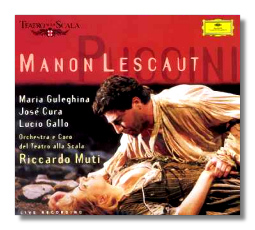
The Internet's Premier Classical Music Source
Related Links
- Puccini Reviews
- Latest Reviews
- More Reviews
-
By Composer
-
Collections
DVD & Blu-ray
Books
Concert Reviews
Articles/Interviews
Software
Audio
Search Amazon
Recommended Links
Site News
 CD Review
CD Review
Giacomo Puccini

Manon Lescaut
- Maria Guleghina (Manon Lescaut)
- José Cura (Des Grieux)
- Lucio Gallo (Lescaut)
- Luigi Roni (Geronte)
Orchestra & Chorus of La Scala, Milan/Riccardo Muti
Deutsche Grammophon 463186-2 DDD 2CDs: 58:10, 61:49
The first of Puccini's operas to become popular, Manon Lescaut is a study of a composer reaching his youthful maturity. Each act is a little less flabby than the one that came before it. By the time we reach Act Four, Puccini has built up a full head of steam, and there's not much distance to traverse between Manon's death on a plain near New Orleans and Mimi's death in a garret in Paris. To get there, we start with an Act One that has its moments (notably the tenor's "Donna non vidi mai," although Puccini cannibalized it from an earlier work), an Act Two that has the heartbreakingly simple "In quelle trine morbide" and a whiz-bang climax, and an Act Three that is full of pathos – just like the equivalent act in La Bohème, but without the great set-pieces.Manon Lescaut has not been blessed with as many great recordings as La Bohème has been. The monaural era gave us Callas and di Stefano in competition with Albanese and Bjoerling – both still viable versions. Since then, we have had good Manons from Tebaldi, Caballé, and Freni (twice). Odessa-born Maria Guleghina is at her best when her character is in the most dire straits. Her death scene is moving, and her desperate attempts to win back Des Grieux in Act Two raise this recording's temperature. Her voice is large, and she drives it hard in the style of a Maria Caniglia or a Renata Scotto. Unfortunately, Guleghina can't muster their Italianate style, and her portrayal has less character than those mentioned above. Nevertheless, she is a singer of whom I would like to hear more, although I think she is more suited for heavier roles. Cura, to be honest, is a gift from God. The international tenor scene looks a lot brighter with his arrival; with Roberto Alagna, he should wear the mantle formerly worn by Pavarotti, Domingo, and Carreras. He is intelligent, with a fantastically virile and emotive voice. He successfully portrays a man who is completely overcome by a self-destructive love for a woman who probably does not merit his passion. He is more heartbreaking than Manon in Acts Three and Four. Long may Cura sing. Although he was born in Argentina, he is a real "Italian" tenor. As Manon's brother, Lucio Gallo makes a positive impression, but there is little to go by in this opera, which is not very generous to its lead baritone. Luigi Roni is a woolly Geronte; his character becomes a caricature in this recording. The smaller roles are done more or less successfully. I feel that the performance (recorded live in June 1998) would have had a greater impact had Riccardo Muti been a more idiomatic conductor. Unfortunately, I don't think Puccini is his composer. This Manon Lescaut is choppy, short-breathed, and brusque – faults I would not have expected to find in an Italian conductor. More T.L.C. from the podium would have helped Guleghina and Cura to win me over completely.
The engineering is bright and even a little brash in the climaxes. There is applause at act ends, but not after arias. Otherwise, the audience is fairly quiet, although there are stage noises.
This is not the finest Manon Lescaut on the market, but it really is worth hearing for José Cura, who I promise you is the Next Big Thing in the opera world.
Copyright © 2000, Raymond Tuttle


















